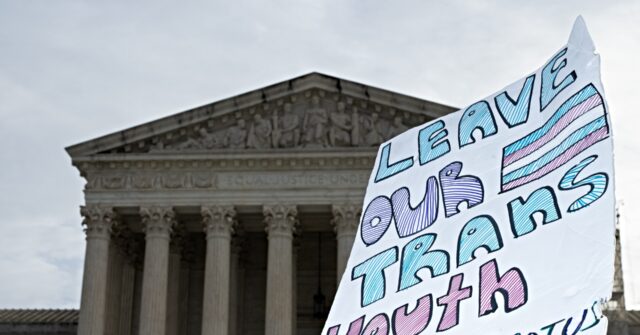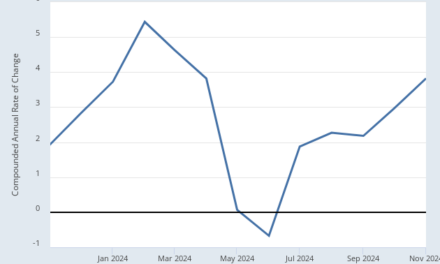We support our Publishers and Content Creators. You can view this story on their website by CLICKING HERE.

Advocates for transgenderism fear the U.S. Supreme Court will allow elected legislators to protect children from the experimental treatments pushed by profit-seeking clinics and their progressives allies.
The worries exploded on Wednesday, December 4, when five of the nine judges showed a willingness to accept the Tennesee child-protection law, despite supporters’ claim that it violates prior court decisions barring different treatment for males and females.
“The argument went terribly for transgender Americans, as many of the justices suggested creating a carveout from the ordinary constitutional rule restricting sex-based discrimination of all kinds,” wrote Ian Millhiser, a legal reporter for the left-wing Vox.com website. He added:
Chief Justice John Roberts, for example, suggested giving the government broad authority to engage in such discrimination in the medical context …
If the Court adopts Roberts’s approach, which seems likely, that’s not just a devastating blow to transgender youth and their families. It’s also a sea change in the Court’s approach to sex discrimination of all kinds.
“During the two hours of bigotry disguised as a hearing, it became clear that the conservative majority is almost certain to uphold the Tennessee law banning gender-affirming care,” said an article in The Nation, a left-wing magazine.
Many of the transgender supporters echoed comments from Justice Ketanji Brown Jackson, one of the three female progressive judges on the court. “I’m worried that we’re undermining the foundations of some of our bedrock equal protection [in sex discrimination] cases,” she said as she listened to the other judges’ questions.
“The argument that judges must step in because Tennessee’s law draws constitutionally invalid lines based on sex appears to be lost,” said a post at NYmag.com by Jessica Levinson, a lawyer at Loyola Law School
However, the court may accept a fallback argument, she added: “The court may be more likely to take action and protect [access to transgender treatments] under an argument that this state law violates parents’ rights to make decisions about their children’s medical care.”
The nine justices were reviewing an appeals court decision in the Skrmetti case, which agreed that the state legislator could set limits on transgender-related medical treatments of physically healthy children.
Progressives denounced the law because they support transgenderism — and they are trying to have the judge defeat the law by claiming it treats girls differently from boys.
But underneath their legal claim, they are also trying to persuade the judges to support transgenderism, which argues against the cultural and legal dominance of the two equal, different, and complementary male or female sexes.
In response, the supporters of the child-protection law say it provides similar protection for both girls and boys, even while hospitals usually apply different transgender-related drugs and hormones to boys and girls.
Moreover, children — and even their parents — have a legal right to consumer-style protections, the law’s supporters say. Children cannot appreciate the long-term risks of agreeing to let for-profit clinics medicalize their bodies’ hormones, sexual function, and appearance, they say.
The transgenderism advocates were hoping that libertarian-minded Justice Neil Gorsuch would use the sexual distinctions argument to defend the transgender medical sector. In the 2020 Bostock decision, Gorsuch used that argument to invent a legal right for people to dress in cross-sex clothing at work.
But QVoicenews.com worried that Gorsuch did not try to apply that sexual discrimination argument in the Wednesday hearing case about the medical treatment of children:
Notably, Justice Neil Gorsuch — who authored the landmark Bostock v. Clayton County opinion that held transgender people cannot be discriminated against in employment — did not ask a single question during the hours-long session.
Many other progressive sites posted dire reports after the Wednesday hearing and suggested that the pro-transgender side could lose by three votes to six.
“Going into arguments, the determinative question was whether Gorsuch would apply his reasoning in Bostock to this case,” said Slate.com, adding:
Yet bafflingly, Gorsuch refused to ask a single question Wednesday. His silence may indicate that he will quietly join an anti-trans opinion that ignores or curtails Bostock’s logic without explaining himself, retreating from his previous position now that the political environment has grown more hostile to trans equality.
“This case stands poised to roll back 50 years of gender discrimination doctrine based on the warped logic of Dobbs about the infinite wisdom of the democratic process and the ineffable mystery of medical science,” the article added. “In so doing it will throw open the door to yet more discrimination against trans adults, women, and other vulnerable groups.”
Transgender advocates are also worried that their hidden influence on the judges is fading because more Americans are using mainstream outlets and social media to recognize that transgenderism is unpopular and risky.
The case is United States v. Skrmetti, No. 23-477 in the Supreme Court of the United States.

 Conservative
Conservative  Search
Search Trending
Trending Current News
Current News 







